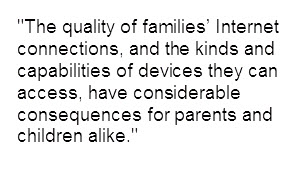
Recognizing that digital devices and the Internet have become so essential in daily life – and that digital inequality can exacerbate educational and economic inequality -- the Joan Ganz Cooney Center at Sesame Workshop surveyed nearly 1,200 low and moderate-income parents about digital connectivity in their households.
The results are highlighted in the recently released report Opportunity for All: Technology and Learning in Lower-Income Families.
The good news, perhaps, is that 91% of families surveyed who are below the federal poverty level ($24,250 for a family of four in 2015) do have some form of Internet connectivity. But as the report points out, not all connectivity or all device experiences are created equal.
 "Many families," the authors note, "face limitations in the form of service cutoffs, slow service, older technology or difficulty using equipment because too many people are sharing devices."
"Many families," the authors note, "face limitations in the form of service cutoffs, slow service, older technology or difficulty using equipment because too many people are sharing devices."
Those with intermittent service or technology challenges are referred to as the "under-connected." Many of them rely on mobile-only Internet access. And of those with home Internet access:
- 52% said their access is too slow to do useful work
- 26% said too many people share the same computer
- 20% said they'd had their access cut off in the past year due to lack of payment
Other key findings
The survey also found that families headed by Hispanic immigrants are less connected than other low- and moderate-income families. In fact, the authors say 10% of immigrant Hispanic families reported no Internet access at all, compared with 7% of U.S.-born Hispanics, 5% of whites and 1% of blacks.
Nearly half (44%) of the immigrant Hispanic parents surveyed said they do not use computers at work, school or at home, even occasionally.
Another key finding: Four in 10 parents who don't have a home computer or Internet access say they simply can't afford it.
Why it matters
"The quality of families’ Internet connections, and the kinds and capabilities of devices they can access, have considerable consequences for parents and children alike," the report states. "When Internet access is intermittent -- either because families have trouble paying monthly service charges or are using the Internet only in community locations -- they face constraints on what they can access online, compared with those who have consistent access."
The report also suggests that the devices families own and feel comfortable using also matter. Things like submitting a job application or completing a homework assignment online can be considerably more difficult on a smartphone than on a desktop or laptop computer.
The report concludes that substantial digital inequalities still exist in the U.S. and the primary obstacle to greater equity is financial. "Constraints on connectivity," the authors say, "are likely to have lifelong individual and societal consequences."
Download the comprehensive report by media and policy expert Victoria Rideout and Rutgers University scholar Vikki Katz to learn about additional aspects of digital connectivity that the survey explored.
##
Compassionate Cities is an initiative of the Smart Cities Council. Learn more about #compassionatecities; follow @Philip_Bane on Twitter.



